Recently, I found myself scrolling through a catalogue of in-flight films when the name Bezos caught my eye. Surely enough, it was a biopic about Jeff Bezos and Amazon’s founding. Having greatly enjoyed the recent BlackBerry as well as older films about tech startups such as The Social Network, Pirates of Silicon Valley and even the more obscure Micro Men,1 I was hoping for something in a similar vein about the founding and history of Amazon and the life of its singular founder Jeff Bezos.
What I got instead was a smaltzy “inspirational” TV movie straight out of the Hallmark catalogue, consisting mostly of enthusiastic but superficial performances to the tune of a script that occasionally made half-hearted attempts to reach for the heights of these other films but fell well short.
The film sketches Bezos’s character with a level of subtlety you might expect from ChatGPT output. The film opens with footage of a Blue Origin launch. This is followed by narration from present-day Bezos about his family, beginning with:
I was born into great wealth, not the monetary kind, but of a loving family.
He speaks in vague but positive tones about his single mother, Jackie, who had him young, his adoptive father, Mike (short for Miguel), who escaped the communist regime in Cuba, and his grandparents, as B-roll of latter-day bald Bezos walking around an Amazon office plays. There’s a touch of the defensive in this opening line, as if Bezos is trying to get ahead of the oft-levelled accusation that receiving Amazon’s initial startup capital from his parents (a key scene in the film) lessens his achievements. Snarky listicles dedicated to busting the myth of the self-made, bootstrapped billionaire often bring this up, as if anyone in the world could turn $300k into a ~$1.9 trillion company in less than three decades. As the film itself states in its white-text-on-black epilogue, Mike and Jackie’s investment had the greatest return in human history.
This theme of “my real familial wealth was emotional” is furthered by a peppering of syrupy flashbacks to a young Jeff learning folksy wisdom from his grandfather, after which the actor playing Jeff Bezos will drop out of a thousand-yard stare and shoe-horn into the movie one of the man’s oft-repeated mantras, such as regret minimisation or customer obsession, which rather cheapens the insights. The film fails to connect these anecdotes to Bezos’s actual business experiences.
The film covers the period from when Jeff Bezos hit upon the idea of starting an Internet commerce company to when Amazon received its first paid order. One early scene shows Jeff Bezos reading an online article about the extraordinary growth of Internet business. The camera zooms in on an italicized sentence. The next day, he reads the article again and highlights the italicized sentence.
“Internet sales are currently growing at 2300% annually.”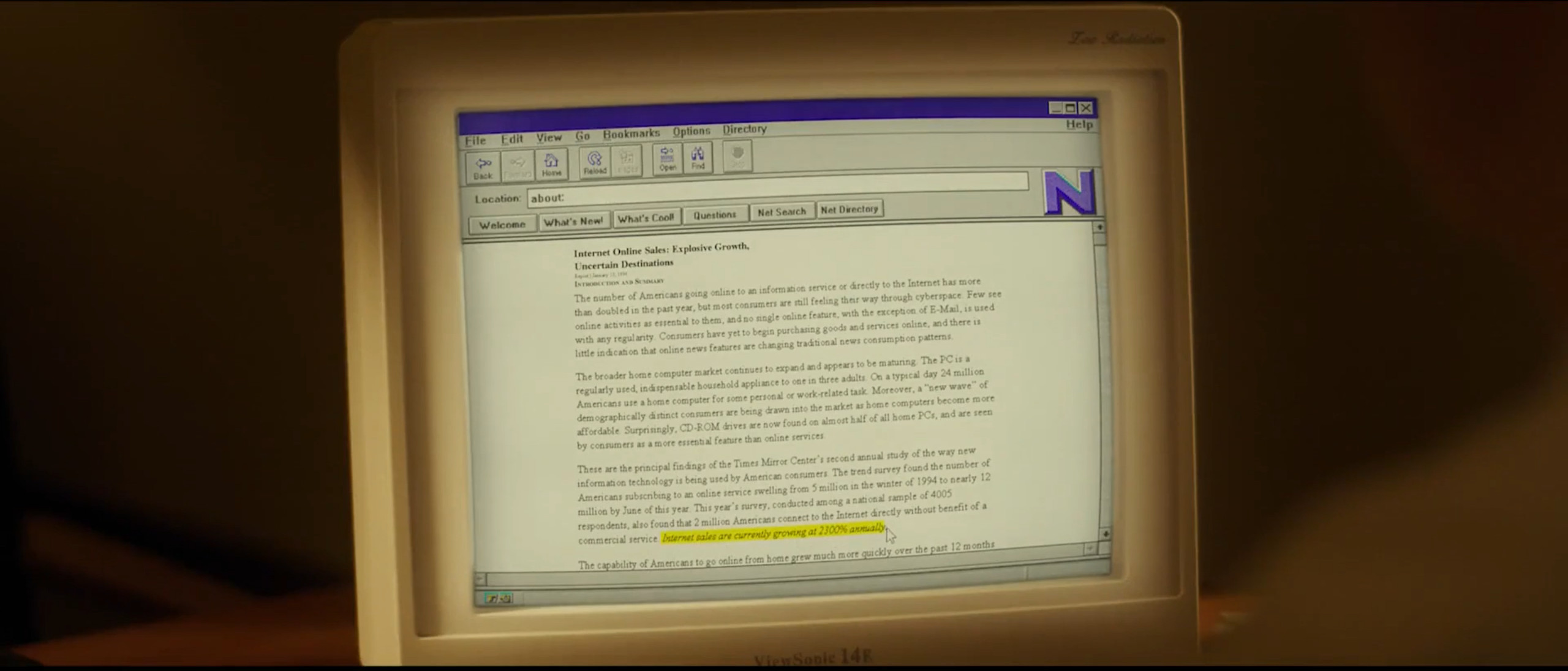
According to Wikipedia, Jeff’s reading an online article really was Amazon’s inciting incident, so points for accuracy, but there have got to be more engaging ways to show that on screen. For all that other movies in this genre have been criticised by their subjects for playing fast and loose with the truth, at least they weren’t boring.
After a painfully inauthentic conversation with his wife and a series of montages, Bezos pitches the idea of an online bookstore to his hedge fund boss. His boss, played by one of the few actors in this movie who seems to be trying to act, shoots down the idea. While initially discouraged by this, Bezos receives some encouragement from his wife and a smaltzy flashback, prompting him to launch into a monologue on the Regret Minimization Framework™ and quit his job to pursue entrepreneurship.
From here, we go through Jeff phoning people to get investment, hiring programmers and moving to Seattle. The film makes the occasional attempt to introduce conflict or drama by having Jeff and Mackenzie argue about something, or Amazon’s programmers complain about long hours and bad pay. The acting does little to sell these moments. Slightly more engaging are Bezos’s confrontations with the CEO of Barnes & Noble, Leonard Riggio.2 Kevin Sorbo, who plays Riggio, has the distinction of being the sole actor in the film who actually seems to inhabit his character. But the film’s tiny scope prevents any real development of this conflict – by the end, Barnes & Noble is still on top and Amazon has only sold one book.
“Hmm, that’s an interesting idea.”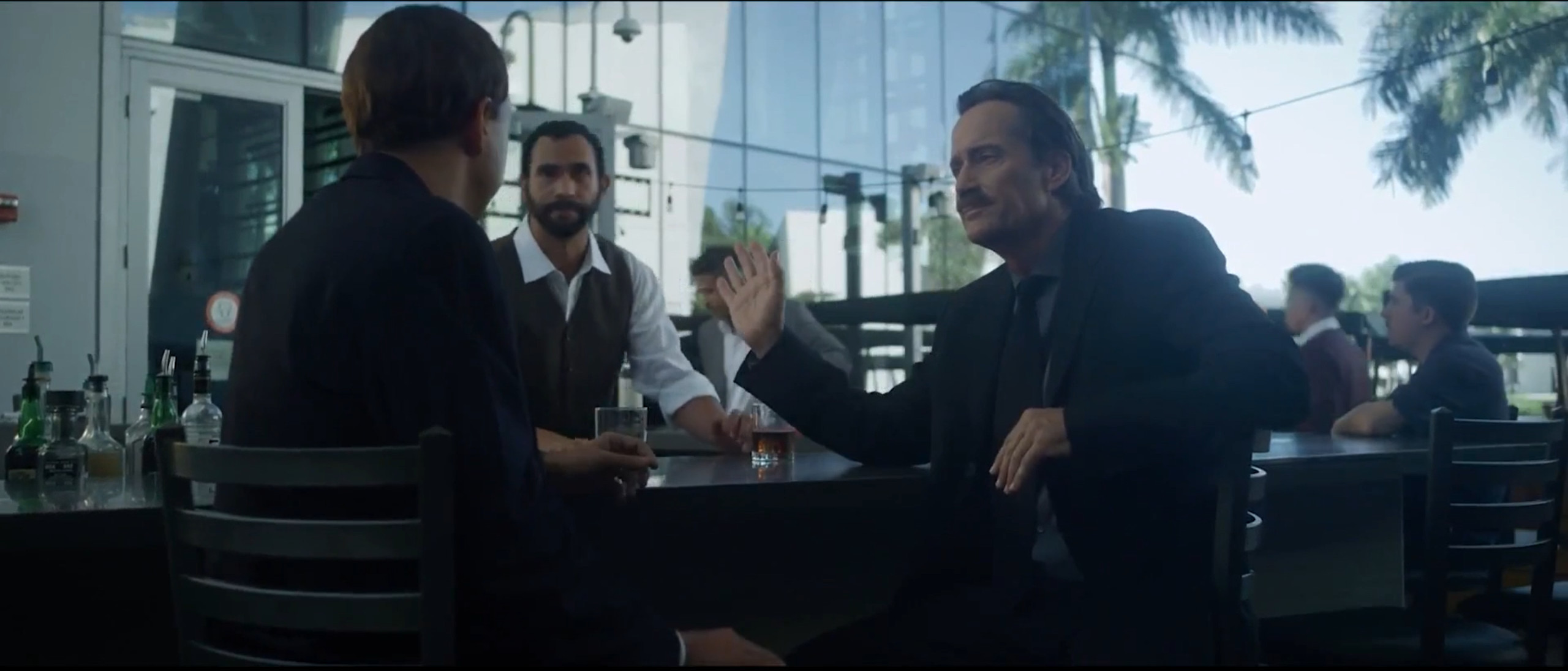
One of my favourite scenes in BlackBerry features technical Co-CEO Mike Lazaridis explaining his plan for a push service through RIM’s servers to get around the problem of bandwidth constraints on early cellular networks to a skeptical AT&T board. This is the sort of thing I’m looking for from a movie like this – moments of genius and real innovation. Bezos seems to be reaching for this sort of moment in a couple of places. In the most successful scene of this nature, the Amazon employees figure out they can skirt book suppliers’ minimum order volumes by padding orders of books they actually want with copies of obscure, out-of-print books which will invariably fail to arrive and not be included in the final charge, which is payable on receipt. Worse moments include Jeff vaguely telling his programmer to make the user interface friendlier and Jeff presenting to a boardroom about how Amazon will ultimately crush its small competitors.3
There’s a recurring joke in which Jeff comes up with a new, usually bad, name for the company, cycling from Cadabra (“like Abracadabra, not like a dead body”) to Relentless.com to TheWorldsBiggestBookstore.com and then finally settling on Amazon.com. I almost laughed a couple times.
In the film’s closing scene, Bezos and company are pulling a characteristic all-nighter at their garage office during the website’s beta testing stage when they hear a ding on one of their computers and realise they’ve just made their first sale. Everyone celebrates, and the screen blacks out for the customary series of white sentences on black backgrounds describing Amazon’s current valuation and Bezos’s current wealth, leaving the viewer with a profound sense of “That’s all? Really? That’s where you’re going to end it?”
In a scene not intended to be paused on, the Amazon team watches in suspense as their lead dev pushes the beta site to prod by typing out code from a random Github repo.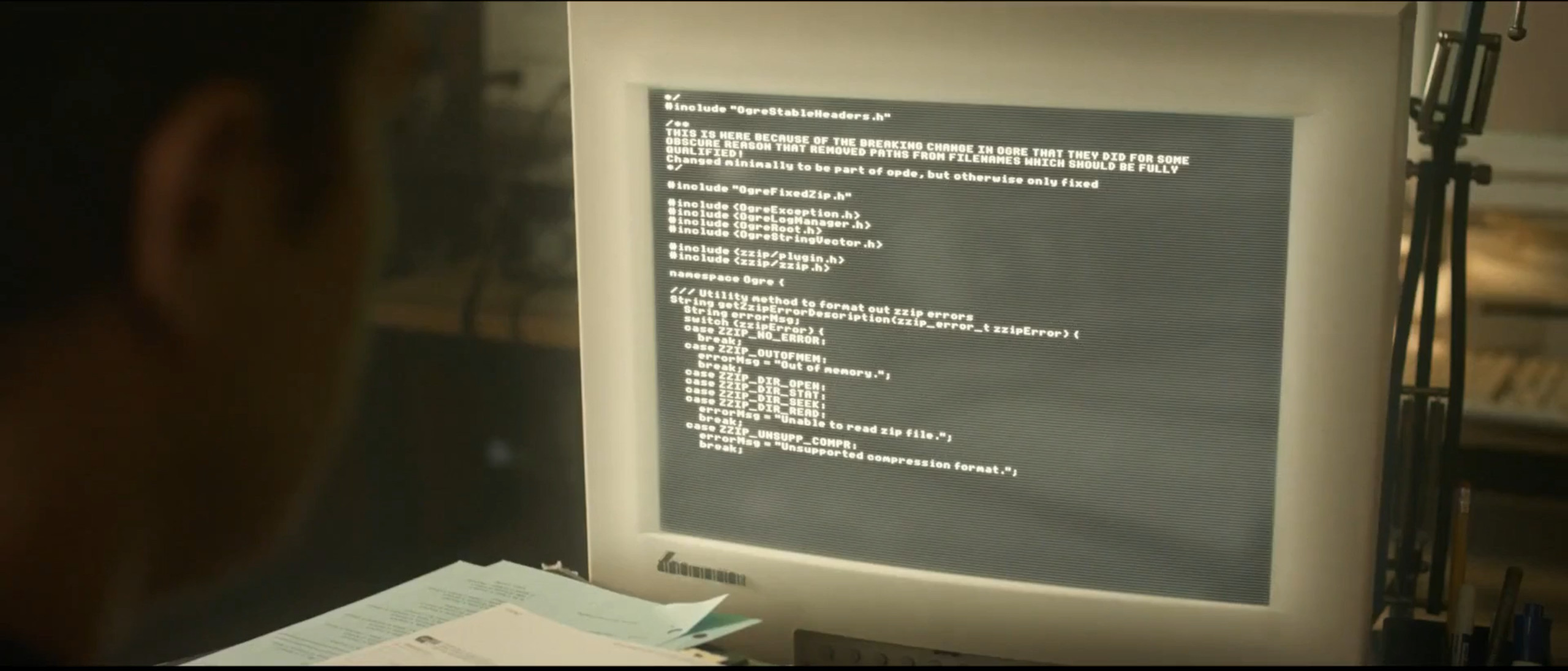
As much as I didn’t want to watch any more of this awful movie, the 99 minutes on offer here didn’t really do justice to the history of the world’s largest online retailer (and cloud hosting provider!). Its subtitle, “The Beginning”, seems to promise multiple sequels, but a better movie wouldn’t need any.
But we can’t blame everything on the scriptwriters – this film was based on a written biography of Bezos.
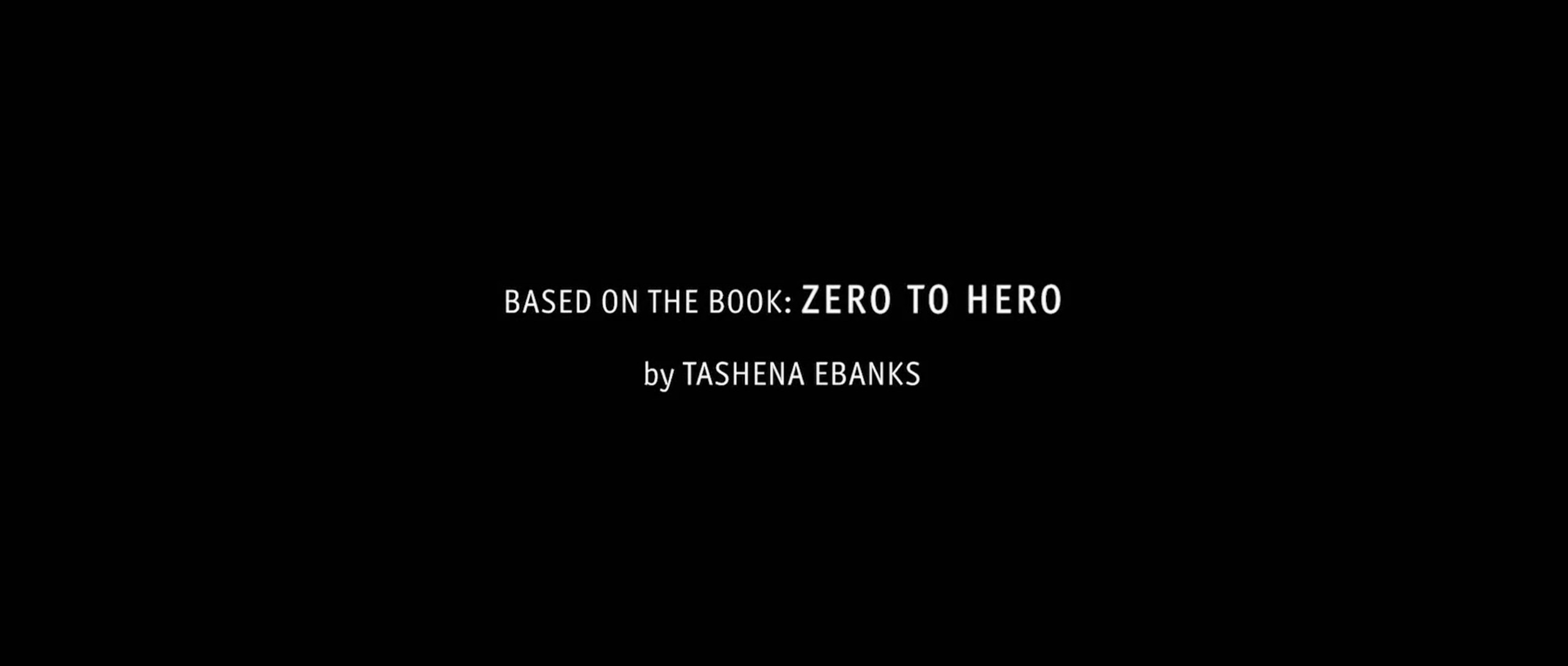
Specifically, Zero to Hero: Jeff Bezos, part of the Zero to Hero series of illustrated biographies for children five years and up.
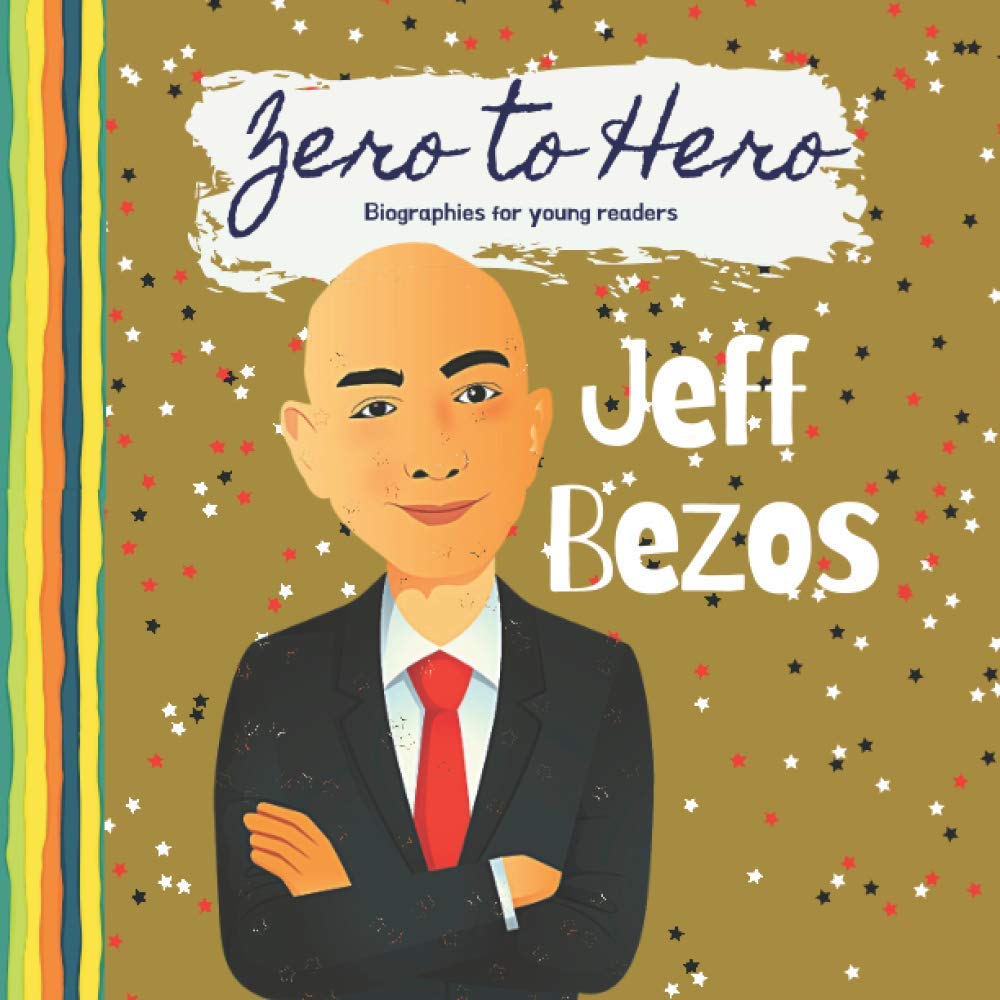
The choice of an obscure children’s book that is only available on Amazon.sg and has no reviews for a biopic of Amazon’s founder is baffling. I can find no information on whether Bezos approved of this project or what he even thinks about it, so I’ll refrain from accusing him of commissioning a hagiography. But I do think he deserves a better movie.
Featuring Martin Freeman as the founder of Acorn Computers. ↩︎
There’s a brief moment after this last scene where the film, speaking through Mackenzie, almost criticises Bezos’s ruthlessness, but you can tell its heart isn’t in it. The Social Network this ain’t. ↩︎
 David Yates.
David Yates.